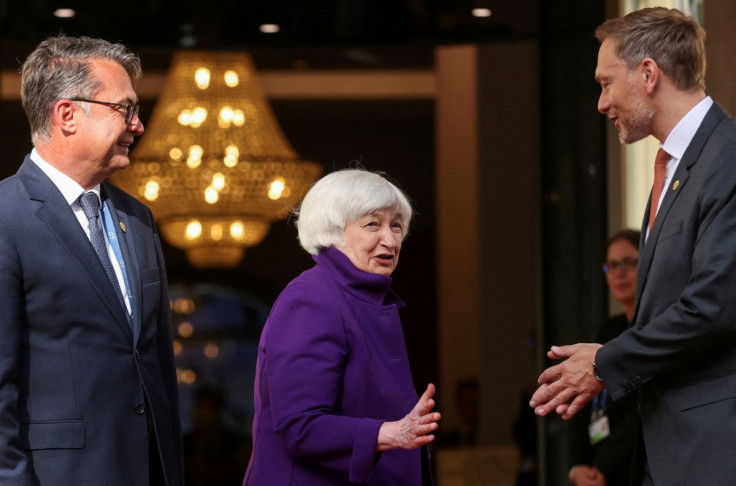G7 To Pledge Billions In New Lifeline For Ukraine Economy

The Group of Seven's financial leaders are expected to unveil billions of dollars in new aid to Ukraine on Friday and promise enough money to keep the country's devastated economy afloat as long as it fights against Russia's invasion.
The finance ministers and central bank governors of the United States, Japan, Canada, Britain, Germany, France and Italy - the G7 democracies - also are discussing next steps on sanctions to pressure Russia to end the war launched on Feb. 24.
In a draft of the group's communique to be issued later on Friday, the G7 officials cited a figure $18.4 billion of budget support for Ukraine this year including $9.2 billion of recent commitments.
"The message was, 'We stand behind Ukraine'," U.S. Treasury Secretary Janet Yellen told reporters late on Thursday. "We're going to pull together with the resources that they need to get through this," Yellen said.
Friday's scheduled sessions also include discussions about the potential for debt crises amid pressures from rising food and energy prices, progress on global corporate tax reform, efforts to finance a transition to renewable energy and a the current state of the COVID-19 pandemic.
RUSSIAN ENERGY CURBS
Amid the sessions, G7 officials also have been discussing proposals to reduce Russia's revenues from energy exports, including a phased embargo proposed by the European Union, forming a buyers' cartel to cap prices for Russian crude and imposing import tariffs on Russian oil.
The latter was floated by U.S. officials as a way of limiting Moscow's oil profits while keeping Russian crude supplies on the market to avoid price spikes.
"Nothing is really crystallized as an obvious strategy," Yellen said about those discussions.
Another G7 official said the pricing caps and tariffs were problematic because producers have little incentive to comply and consumers could end up bearing the brunt of the added costs.
In the draft communique, the G7 welcomed the European Commission's proposal on Wednesday to lend 9 billion euros ($9.52 billion) to Ukraine. It also noted that the European Bank for Reconstruction and Development and the International Financial Corporation planned support worth $3.4 billion, but it was not clear if it was part of the $18.4 billion or a separate commitment.
Yellen said that a $40 billion U.S. aid bill for Ukraine, passed overwhelmingly by the U.S. Senate on Thursday, included about $7.5 billion in new economic assistance.
Ukraine estimates it needs some $5 billion a month to keep public employees' salaries paid and the administration working despite the daily destruction wrought by Russia.
The war has been a game-changer for Western powers, forcing them to rethink decades-old relations with Russia not only in terms of security, but also in energy, food and global supply alliances from microchips to rare earths.
TAMING INFLATION BEAST
More broadly, the G7 policymakers are wrestling with the question of how to contain inflation and increase sanctions pressure on Russia without causing recession.
More and more officials have brought up the term "stagflation" - the dreaded 1970s combination of persistent price increases coupled with economic stagnation.
"G7 central banks are closely monitoring the impact of price pressures on inflation expectations and will continue to appropriately calibrate the pace of monetary policy tightening in a data-dependent and clearly communicated manner," the draft said.
They will ensure "that inflation expectations remain well anchored, while being mindful to safeguard the recovery and limit negative cross-country spillovers," it said.
Most of the efforts on Ukraine aid were to fund Kiev's immediate cash needs, but the G7 officials called for supporting long-term reconstruction and recovery, the draft said.
Economists' estimates of the cost of rebuilding Ukraine vary widely between 500 billion euros and 2 trillion euros, depending on the assumptions on the length of the conflict and the scope of destruction.
($1 = 0.9452 euros)
© Copyright Thomson Reuters 2024. All rights reserved.







